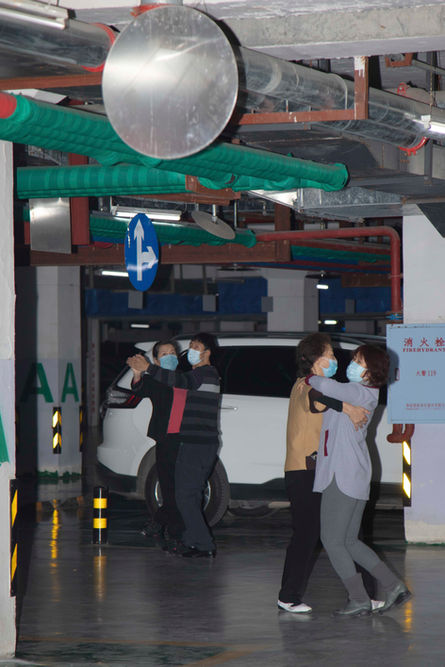Black Soil Cannot Answer Me I was born in Heilongjiang Province, located in the northeastern part of China. Every time winter approaches, the distant northwest monsoon brings cold air to this plain, covering the black soil with ice and snow. The tall chimneys of collectively heated buildings in the city emit black smoke, and the air is filled with the smell of coal ash. The black soil marks the beginning of this story. This region is China's borderland, neighboring Russia and North Korea. People from other areas collectively refer to Heilongjiang Province, Jilin Province, and Liaoning Province as the Northeast region. Throughout its long history, this place has been inhabited by ethnic minorities, with sparsely populated and vast uninhabited areas. It was not until the Qing Dynasty that a large number of people from Shandong migrated here to cultivate the land due to resource competition, bringing agricultural civilization to this region. Through voluntary immigration and long-term integration, the border areas formed immigrant communities with a cultural characteristic of individualism higher than other regions. Groups of immigrants with common goals developed a culture that was institutionalized and passed on norms and beliefs to others and the next generation. The unique natural conditions and frontier politics make people under collectivism here have a distinct self-independence different from other regions, creating a complex contradiction. Oil, steel, and coal mines are gifts of the black soil. From the late Qing Dynasty to the early 20th century, it took only a few decades for immigrants to transform this uninhabited area into one of China's most important grain-producing regions. In 1949, with a shift in the country's development goals, the Northeast Black Soil Plain transitioned from an agricultural hub to a heavy industrial area. Oil, steel, and coal mines provided the conditions for the region's industrial development, making the Northeast a significant industrial base in China. Intensive collective labor led to the formation of public spaces and institutional foundations centered around state-owned factories, transforming the farmers living on this land into the working class and creating a distinct collective consciousness shaped by systematic training. The Northeast has always been a passive participant in history. In the 1990s, China's economic system shifted from a planned economy to a market economy. The reform of state-owned factories led to massive layoffs, and many workers faced the risk of unemployment, resulting in a wave of job losses. They faced the societal transformation with confusion, as the welfare benefits and lifelong worker status they once took pride in as employees of state-owned factories became history. They experienced tremendous psychological disparity, drifting into a state of uncertainty and self-hypnosis. It was a time of collective desolation, a trauma for the Northeast. Black soil cannot answer me. As descendants of the Northeast, we also feel the powerlessness of individual fate in the face of historical changes. They are pushed by the tide of marketization, popularization, and urbanization. The descendants who have also experienced the pain of the Northeast place a much higher value on a stable life than the pursuit of wealth. The elite selection model and social operation methods of contemporary society make them more concerned about the flow of power. Through intense competition, they become employees within the government system. People living here attempt to counterbalance the absurdity of reality and the subtle indoctrination through self-deprecating humor. Many have also chosen to leave. The strict implementation of the family planning policy has led to an extremely low birth rate, and the outflow of population has made the Northeast the most severely declining region in terms of population growth in the country. This project was created after I left my hometown and returned to the Northeast several years later. After leaving my hometown, I have constantly pondered how the Northeast has shaped my understanding of identity and belonging. This project aims to convey the unique cultural atmosphere and social background of the Northeast through photography, depicting the bond and emotional entanglement between myself and this land. It explores the influence of spaces on interpersonal relationships, as well as the roles of traces of life, subtle indoctrination, and collective memory within them.
黑土无法回答我 我出生在中国东北方的黑龙江省,每当冬天来临,遥远的西北季风将冷空气带到这片平原,冰雪将黑土覆盖,城市里集体供暖的大烟囱会冒出黑烟,空气里都是煤渣的味道。 黑土是这个故事的开始。 这里是中国的边疆,与俄罗斯和朝鲜为邻。其他地区的人将黑龙江省,吉林省和辽宁省统称为东北地区。在很长的历史中,这里是少数民族的居住地,人口稀少有大量的无人区。直到清朝,因为资源竞争,大量来自山东地区的人迁移到这里开荒种地,将农业文明带到这里。自愿到边疆地区开拓的移民, 经过长期的融合形成移民地区, 这个地区具有个体主义高于其他地区的文化特征。具有相同目标的移民组成的群体, 发展出一种文化, 以制度化的规范和信念传递给其他人以及下一代。特殊的自然条件和边疆政治让集体主义下的人们又带有明显区别于其他地区的自我独立性,是一个复杂的矛盾体。 石油,钢铁和煤矿是黑土的礼物。 从清朝末年到20世纪初,移民仅仅用几十年的时间将这片无人区开拓成为中国最重要的粮食产区之一。1949年,随着国家发展目标的转变,东北黑土平原从农业重地转变为重工业区。石油,钢铁和煤矿为地区的工业化发展提供了条件,使东北地区成为中国重要的工业基地之一。高密度的集体劳动,造就了以国有工厂为单位的公共空间和制度基础,让生活在这片土地上的农民变成了工人阶级并且形成了被系统化规训的特殊群体意识。 东北,从来都是历史被动的参与者。 20世纪90年代,中国的经济制度从计划经济改为市场经济。国有工厂的改革导致了大量的裁员,众多职工面临失业风险,形成了下岗潮。他们面对社会转型不知所措,曾经引以为豪的国有工厂的福利待遇和终身制工人的身份成为历史,他们经受巨大的心理落差,走向无所适从和自我催眠。这是一个群体落寞的时代,是东北的创伤。 黑土无法回答我。 作为东北地区的后代也感受到了历史变革中个体命运的无力感。市场化、大众化、城市化的浪潮推搡着的他们。同样经历东北阵痛的后代对于安稳生活的渴望远远高于对于财富的追求,当代社会的精英选拔模式和社会运行方式使他们更关注权力的流动,他们通过激烈竞争成为政府系统的工作人员。生活在这里的人试图通过幽默的自嘲抵消现实的荒谬和潜移默化的规训。也有很多人选择离开这里。曾经严格执行的计划生育政策导致极低的生育率,以及人口流失让东北地区成为全国人口负增长最严重的地区。 这组作品是我离开家乡几年后又返回东北拍摄的。离开家乡后,我一直思考着东北是如何塑造了我对身份和归属感的认知。这个项目旨在通过摄影的方式,传达出东北独特的文化氛围和社会背景,呈现出我个人与这片土地之间的纽带和情感纠葛,探讨场域对人们相互作用关系的影响,以及生活痕迹、潜移默化的规训和集体记忆在其中所扮演的角色。

























